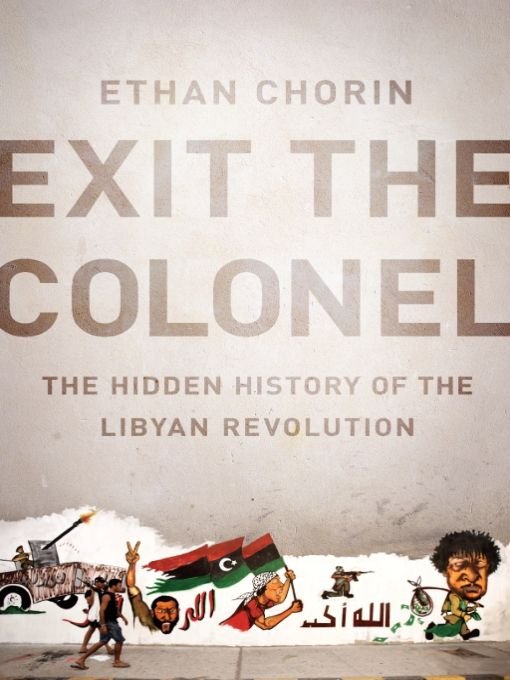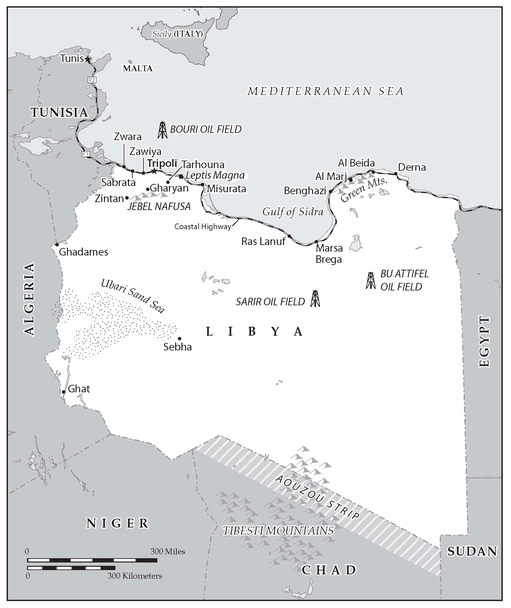Exit the Colonel
Authors: Ethan Chorin



Table of Contents
Â
Â
Â
Â
Â
Â
For my parents

INTRODUCTION
The Sultan . . . was condemned to endure a bizarre sort of apocalypse, a living nightmare so awful he couldn't bear to rest his head on his pillow or close his eyes at any time of day or night, for fear of dreaming of a certain black dog. The dog was a hideous sight: putrid, offensive, with gouged-out eyes. Invariably, it appeared to the Sultan above the hills of dry sand spread beneath Jalo's ramparts. It reared its ugly head, howling in such a crazed state that the hills themselves appeared to drown in its odious inhalations.
SADIQ NEIHOUM, “THE SULTAN'S FLOTILLA”
1
1
Â
Â
Â
T
he late Sadiq Neihoum, Libya's preeminent political philosopher of the 1970s and 1980s, and a onetime adviser to Colonel Muammar Gaddafi, wrote the fable from which the above passage is taken in the late 1970s. The fact that the Sultan was meant to be Gaddafi would have been obvious to the readers even then (which is likely, in part, why Neihoum's writings were subsequently banned and Neihoum forced into exile).
he late Sadiq Neihoum, Libya's preeminent political philosopher of the 1970s and 1980s, and a onetime adviser to Colonel Muammar Gaddafi, wrote the fable from which the above passage is taken in the late 1970s. The fact that the Sultan was meant to be Gaddafi would have been obvious to the readers even then (which is likely, in part, why Neihoum's writings were subsequently banned and Neihoum forced into exile).
For years, the Sultan searches in vain for a cure for ceaseless visions of being mauled by a rabid black dog. One day, a “wise traveler” arrives with a warning and a solution: the black dog of the Sultan's dreams represents a God-given catastrophe that will occur seven years hence. If the Sultan prepares properly for this cataclysm, by building the equivalent of Noah's ark (the Sultan's flotilla), the black dog will appear only once each year, for seven years, before breaking down the final Palace wall. The Sultan is overjoyed at the news, and as an expression of thanks, marries the wise man to his daughter. The catastrophe arrives as predicted. The people of the kingdom survive, and prosperity returns to the Kingdom. The Sultan, however, does not survive. When viewed from 2011, Neihoum's story proved to be a strangely prescient allegory for Gaddafi's rule and the reform process, which lasted from 2004 to 2011âprecisely seven years.
The black dog could represent any number of rising threats, from Gaddafi's domestic Islamic resistance to Libya's disgruntled, disenfranchised youth. The Sultan's flotilla is an apt metaphor for the rapprochement between Libya and the Westâa “solution” that proved neither practical, nor effective. The “wise man” might be a composite of Gaddafi's second-eldest son Saif, and intelligence head Musa Kusa, or, better yet, British Prime Minister Tony Blair.
The black dog could represent any number of rising threats, from Gaddafi's domestic Islamic resistance to Libya's disgruntled, disenfranchised youth. The Sultan's flotilla is an apt metaphor for the rapprochement between Libya and the Westâa “solution” that proved neither practical, nor effective. The “wise man” might be a composite of Gaddafi's second-eldest son Saif, and intelligence head Musa Kusa, or, better yet, British Prime Minister Tony Blair.
While he was unmistakably a despot, Gaddafi detested the image and took great painsâhowever manufactured the attemptâto present himself as something altogether more benign: Gaddafi did not rule, the people ruled; Gaddafi did not exercise any formal control, he only offered advice. Libya's “state of the masses” was, in his view, the world's “only true democracy.” However he wished to see it, Gaddafi dispensed defective advice, committed heinous crimes against his own people, and set Libya's international identity as a state sponsor of terror and global stirrer of pots.
This is the story of Gaddafi's departure from the Libyan stage. Its roots begin with eighteen years of Monarchy, thirty years of Italian occupation, and before that, successive Ottoman and Byzantine intrusions. The story includes the 1969 coup that brought Gaddafi to power and the decades of international repression, terror, and international notoriety that followed. Yet the narrative ultimately hinges on a few-year period when things had potential to change drastically, for better or worse.
In 2003, Gaddafi signed what many inside and outside his circle had thought an “impossible deal” with the United States (as in, the US would never agree), abandoning his weapons of mass destruction (such as they were) and agreeing to compensate the families of the victims of the 1988 Lockerbie bombing and to share intelligence in service to the West's war on terror. In return, UN- and US sanctions on Libya were lifted, allowing Gaddafi to sell his oil more freely, attract international investment into his ailing oil infrastructure, and assume an altogether more public persona.
Other books
Heart by Garrett Leigh
Nemesis Unlimited [1] Sweet Revenge by Zoë Archer
Sharpe's Revenge by Bernard Cornwell
Minnie Crockwell - Will Travel for Trouble 03 - Trouble at Glacier by Minnie Crockwell
Broken Wings 02 Midnight Flight by V. C. Andrews
Dodsworth in London by Tim Egan
The Best Australian Stories 2010 by Cate Kennedy
Icing On The Date (The Bannister Brothers #1) by Jennie Marts
Old Magic by Marianne Curley
Cross Fire (Padre Knights MC Book 3) by Evelyn Glass